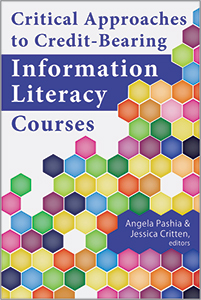Primary tabs
You don't need to be an ALA Member to purchase from the ALA Store, but you'll be asked to create an online account/profile during the checkout to proceed. This Web Account is for both Members and non-Members. Note that your ALA Member discount will be applied at the final step of the checkout process.
If you are Tax-Exempt, please verify that your account is currently set up as exempt before placing your order, as our new fulfillment center will need current documentation. Learn how to verify here.
- Description
- Table of Contents
- About the authors
Critical librarianship understands the work of libraries and librarians to be fundamentally political and situated in systems of power and oppression. This approach requires that information literacy instruction expand its scope beyond straightforward demonstrations of tools and search mechanics and towards more in-depth conceptual work that asks questions about, among other things, the conditions of information production, presumptions of neutrality, and institutionalized oppression.
It is vital that information literacy instruction examine the political, social, and cultural dimensions in which information is created and acknowledge that students bring a lifetime of rich experience into the classroom. This fundamentally critical work should manifest in library instruction in two ways: critical pedagogy, which examines how we teach, and critical information literacy, which generally examines what we teach.
Critical Approaches to Credit-Bearing Information Literacy Courses includes chapters that examine how both critical pedagogy and critical information literacy are applied throughout a credit-bearing course as well as in specific lesson plans. The ideas explored in this book can be adapted for a variety of class and course lengths and for a range of students, from first-year undergraduates to doctoral students. Chapters include case studies of how information literacy courses can respond to preconceptions and unexamined ideologies students may bring to the course; explorations of marginalized knowledge and racial bias and justice in the information literacy course; individual lessons or sets of lessons situated within the larger course context; and reflections on the process of developing a more critical approach. Critical Approaches to Credit-Bearing Information Literacy Courses can provide valuable strategies for those just starting to adopt a critical approach as well as new perspectives for those with more experience in this area.
Chapter 1. Introduction
Angela Pashia and Jessica Critten
Chapter 2. No Room for Argument: Researching Politicized Topics as a Learner
Susan Wood
Chapter 3. Critical Credits: Making the Most of a First-Year Information Literacy Class
Erin Anthony, Rebekah Miller, and Marcia Rapchak
Chapter 4. When Students Accept Their Corporate Overlords: Privilege and Position in Our Information Society
Kate Hinnant and Robin Miller
Chapter 5. Balancing Acts in the Critical Library Classroom: Inviting Constructive Dialogue and Resisting “Post-Truth” Discourse in Politically Contentious Moments
Andrea Baer
Chapter 6. An Unfinished Journey: Towards a Democratic Information Literacy Classroom
Rachel Dineen and Lyda Fontes McCartin
Chapter 7. Reflections on Adopting a Critical Media and Information Literacy Pedagogy
Spencer Brayton and Natasha Casey
Chapter 8. Opening to the Margins: Information Literacy and Marginalized Knowledge
Christine M. Larson and Margaret Vaughan
Chapter 9. Manufacturing a Context: Rhetorical Implications of Standalone Critical Information Literacy Courses
Joel Burkholder
Chapter 10. Using Fan Studies to Put Information Literacy in Context: On Teaching a Credit Course
with a Theme
Nancy Foasberg
Chapter 11. The Machine Stops: Critical Orientations to Our Information Apparatus
Patrick Williams
Chapter 12. Examining Structural Oppression as a Component of Information Literacy
Angela Pashia
Chapter 13. Teaching Copyleft as a Critical Approach to “Information Has Value”
Kenneth Haggerty and Rachel E. Scott
Chapter 14. Wikipedia-Based Assignments and Critical Information Literacy: A Case Study
Amanda Foster-Kaufman
Chapter 15. Exploring Epistemological Lineages: Using the Gallery Walk with Students and Instructors of a First-Year Seminar Course
Gina Schlesselman-Tarango
Author Biographies
Angela Pashia
Angela Pashia has over a decade of experience as an academic librarian focusing on teaching critical information literacy, mentoring colleagues, working against structural oppression within libraries, and growing as a collaborative leader. Angela’s first co-edited book (with Jessica Critten), Critical Approaches to Credit-Bearing Information Literacy Courses, was selected as an ACRL Instruction Section, Teaching Methods Committee Selected Resource in 2020. Angela currently works as professor and head of the learning and research support department at Ingram Library, University of West Georgia, and is beginning to explore opportunities to support other scholars as an academic writing and career coach.
Jessica Critten
Jessica Critten is the pedagogy and assessment program lead at Auraria Library, which serves University of Colorado-Denver, Community College of Denver, and Metropolitan State University of Denver. Her current research examines applications of standpoint epistemology in information literacy instruction and the rhetoric of evidence-based practice in LIS. She is a graduate of Florida State University, where she received her MLIS and an MA in interdisciplinary humanities.



